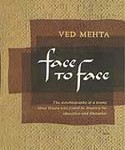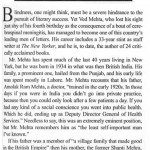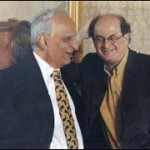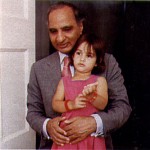Ved Mehta — Unique Documentarian
Ved Mehta has been a staff writer with The New Yorker for 17 years. This Thursday at 9 P.M., Channel 13 will televise his first film, an hour-long documentary, entitled “Chachaji: My Poor Relation.” While it is not uncommon for writers to turn from their typewriters to the world of purely visual images, this documentary may well be a first in the history of filmmaking inasmuch as Mr. Mehta is totally blind and has been so since the age of 4, when he almost succumbed to a bout of meningitis.
I recently visited this writer-turned-filmmaker in his Fifth Avenue apartment. Mr. Mehta, a trim, erect, 44 year-old bachelor was nattily-attired in a dark gray pinstriped suit, a pale lavender shirt and a deep lavender tie. The clothes were custom-made—and English. Neat displays on his living-room walls included original Saul Steinberg drawings and 19th-century miniature painting from North Indian kingdoms.
Mr. Mehta said that he considered himself as being part Indian (he was born of affluent Indian parents in India and lived there until the age of 15), part English (he has a degree in modern history from Oxford University) and part American (he studied at the Arkansas School for the Blind, Pomona College, as well as Harvard University, and he is now an American citizen). But mostly, Mr. Mehta considers himself an expatriate. “To be a writer,” he said, “is, in a sense, to belong to no place. Writers are outsiders. They carry the universe in their heads and are alienated from the society they live in.”
Why did Mr. Mehta turn to filmmaking? “Last fall, I was sitting in my New Yorker office when I received a call from David Fanning of WGBH in Boston. He said he was putting together a series of unusual international films. The series would be called ‘World.’ David wanted to see me about their doing a film on India.”
Mr. Mehta suspected he was being called in as a consultant to provide background information. As it turned out, Mr. Fanning wanted him to suggest a subject, write the script and then go to India with a crew—which would include a director and a cameraman—and actually shoot the film. Mr. Mehta agreed, but on his terms. The subject would be his father’s 83-year-old, ne’er-do-well cousin, Chachaji (Respected Uncle), a very poor relation who lives partly by working at two low-paying jobs (he is seen being fired from one of them during the course of the filming) but mainly by sponging off his wealthier relatives.
“This way,” Mr. Mehta said, “the documentary would not be about the India but about my personal India. The only way to know a country or a people is to get involved with someone specifically. Abstract India, with facts and figures about its poverty or birthrate, would mean very little.”
There was to be no written script as such, just rough guidelines drawn up by Mr. Mehta. The crew would then fly to India with Mr. Mehta and improvise their way through a documentary film. If Chachaji turned out to be elusive or difficult to photograph, Mr. Mehta would switch to another subject. “How could we miss with a country like India? There are hundreds of films to be made there,” he said.
What made Mr. Mehta pick his uncle as a subject? “As a youngster,” he explained, “I always identified with Chachaji. His education was limited and so was mine. By the age of 15, I had had roughly four years of schooling. My English vocabulary was limited to about 300 words. Although Chachaji worked at several jobs—he was a rat-catcher once—he was dependent on the family for support. What with educational facilities for the blind being so limited in India, I would think of Chachaji and say to myself, ‘There but for the grace of God go I.’ Chachaji was odd because he had a double thumb on one hand. I was odd because I couldn’t see. In my childish imagination, I felt we had a lot in common. Besides, I had a brush with poverty in India at a very early age, and I am guilt-ridden about it. (Mr. Mehta spent three years of his life, from the age of 5 until 8, in a Bombay orphanage where some of India’s poorest and most unfortunate Dickensian creatures learned about survival and caning chairs. His upper middle-class parents sent him there, because it was the only school in India where some instruction was available for the blind.) There were people all along in my life—in the Bombay school, in the Arkansas school—who were really gifted. But they never got a chance. There is a lot of guilt connected with that. I feel lucky to have surmounted my problems, but I feel I have to recreate the world of poverty I knew for other people. That world is summed up much better by Chachaji than by people who go to East Hampton.”
Because of his early years of enforced idleness (between the ages of 8 and 13, Ved Mehta stayed at home flying kites, riding a bicycle, gossiping with the servants and doing little else) he now works almost without pause.
“If I am lying on a beach,” he said, “I think, ‘I could be reading.’ It takes me four times as long as most people to do everything. Even reading requires certain apparatus—books in Braille and readers. I have to organize, arrange for readers. I really think of work as salvation in the sense that work anesthetizes one’s problems. I feel most alive when I’m working. It must have to do with those years of idleness when I had nothing to do and when I had this exaggerated sense of time passing by and my just falling behind in the world.”
Mr. Mehta, unlike his uncle, became self-sufficient as soon as opportunity presented itself. In his first of ten books, Face to Face, an autobiographical account of his early years, he wrote that at the Arkansas School he was taught how to use a cane to assist in walking. He broke his cane in two, convinced that he could manage very well without it. It did mean falling into open manholes, but his “facial vision”—the sense of objects close to him—has served him very well. He is fiercely independent, taking buses, taxis and airplanes without trepidation—or assistance.
Mr. Mehta originally turned to writing out of a sense of loneliness. “I thought I was a one-book writer,” he said, referring to Face to Face, “that I had only one story to tell. But then I met Mr. William Shawn, the editor of The New Yorker, who encouraged me to write more.”
Was it difficult for Mr. Mehta to deal with film, a medium in which he would have to rely so much on other people’s judgment? “Writing, for me,” he said, “has always been an act of imagination. I don’t actually see the people I describe, but I can imagine them. In that sense, television is not all that different. Since I knew India, I knew the language, I knew my uncle and my family. I could lead the director, Bill Cran, to the pictures. Of course, he had to decide whether the pictures were worth taking.”
I asked if it was easy to place his complete trust in the collective vision of the film’s director and crew. “My whole life,” he answered simply and gently, “has been of one long trust. I trust that when I say a sentence, it will be written as I said it. Also, writing is an act of individual imagination, but television is an act of collaboration.” (Mr. Mehta chooses such things as clothes and furnishings with the help of others, but makes all final decisions himself according to his own “sense of color and style.”)
In as much as Mr. Mehta has lived all of his adult life—29 years—in the West, most of it in America, why was India so often the subject of his writings and now of his film? “The writers’ universe,” he explained, “is their childhood and their family. The world we know through our childhood and our mothers remains the most important one. In that sense, I am completely Freudian. I used to think it would be a terrible liability being torn between East and West and not belonging to any national tradition, but when I look around me in New York, I find that we are living in a rootless society, in a world where there is no sense of community. Perhaps that is why I have written almost a million words explaining the country of my childhood to myself and to others.”
Was the subject of Mr. Mehta’s documentary, “Chachaji,” with his Buster Keaton-like face and his shuffling gait, a man who seems to have suffered all the world’s indignities, including having his wife run away with the lodger, and who openly calls himself “the family representative of the starving millions,” at all difficult to photograph? Had he ever got self-conscious, pursued as he was, by a camera crew for several weeks of his life? Chachaji was watched as he made tea, went to the toilet, as he missed buses, visited relatives in a village that was being pelted with giant hailstones and even as he clumsily stumbles in the holy waters of the Ganges while taking a ritual bath.
“You know,” Mr. Mehta said, “Chachaji never, for a moment, understood what was happening to him. He referred to me as ‘King of New York’ and thought I was putting together a photograph album. He even asked for pictures to give his son. When I said, ‘This is a movie, ‘ he countered with, ‘But I am not an actor. ‘ Chachaji never could make the connection between Indian movies he had seen in cinema houses and documentary films.”
Mr. Mehta clearly feels very enthusiastic about making films. As he offered some coffee from his Georgian coffee pot, his face broke into a grin. “Perhaps I’ll make a feature film some day,” he said.





